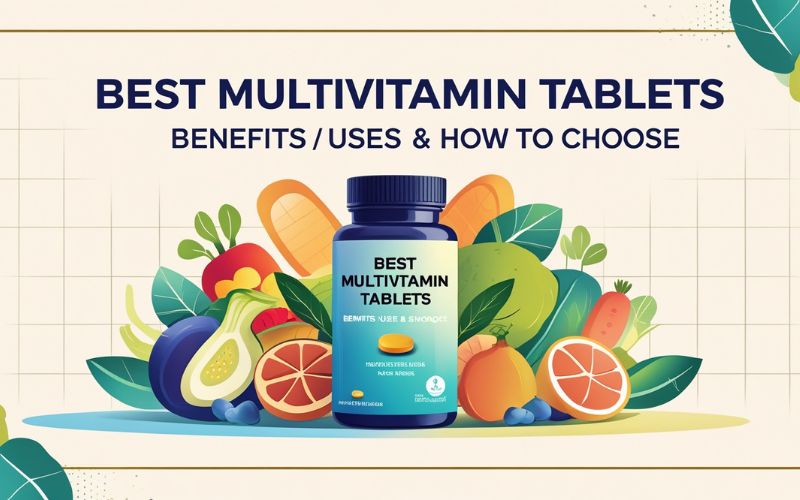In today’s fast-paced world, maintaining a perfectly balanced diet can be a challenge. Processed foods, busy schedules, and dietary restrictions often lead to nutritional gaps, making it difficult to get all essential vitamins and minerals from food alone.
This is where multivitamin tablets step in. These supplements provide a convenient way to ensure your body gets the nutrients it needs to function optimally.
But with so many options on the market, how do you know which multivitamin is right for you? Understanding their benefits, who should take them, and how to choose the best one will help you make an informed decision for your health.
Table of Contents
Key Benefits of Multivitamin Tablets
Multivitamins offer a wide range of health benefits, addressing various nutritional deficiencies and supporting overall well-being.
- Supports Immune Health: Essential vitamins like C, D, and zinc help strengthen the immune system, reducing the likelihood of infections and illnesses.
- Enhances Energy Levels: B-complex vitamins play a crucial role in converting food into energy, preventing fatigue and keeping you active throughout the day.
- Promotes Brain Function and Mental Clarity: Nutrients like omega-3, magnesium, and vitamin B12 support cognitive function, memory, and concentration.
- Strengthens Bones and Muscles: Calcium, vitamin D, and magnesium work together to keep bones strong and reduce the risk of osteoporosis, especially as you age.
- Aids in Heart Health and Overall Well-being: Antioxidants such as vitamin E and selenium protect the heart and support cardiovascular function.
Who Should Take Multivitamins?
Multivitamins are not just for those with specific deficiencies. They can be beneficial for various groups, including:
- Individuals with Nutrient Deficiencies: Those lacking essential vitamins due to poor diet or medical conditions can benefit significantly.
- Busy Professionals and Students: Long work hours and irregular meals may lead to nutrient imbalances, making supplementation helpful.
- Pregnant and Breastfeeding Women: Increased nutritional demands during pregnancy require additional vitamins like folic acid and iron.
- Seniors with Dietary Gaps: Aging can reduce the body’s ability to absorb nutrients from food, necessitating additional supplementation.
- Athletes and Fitness Enthusiasts: Intense physical activity increases the demand for vitamins and minerals for muscle recovery and endurance.
How to Choose the Best Multivitamin Tablets

With countless multivitamin brands available, selecting the right one can be overwhelming. Consider these factors:
- Check Ingredient Transparency and Quality: Opt for brands that clearly list ingredients and avoid
hidden additives. - Understand Dosage and Daily Requirements: Ensure the multivitamin provides adequate amounts of essential nutrients without exceeding safe levels.
- Choose Based on Age, Gender, and Lifestyle Needs: Nutritional requirements vary between men, women, seniors, and children, so pick accordingly.
- Look for Third-Party Testing and Certifications: Verified supplements ensure quality and safety, free from harmful contaminants.
- Avoid Unnecessary Fillers and Artificial Additives: Some supplements contain synthetic colors, artificial flavors, and preservatives choose clean, natural options.
Potential Side Effects and Precautions
While multivitamins offer numerous benefits, improper use can lead to unwanted effects:
- Overconsumption Risks and Toxicity: Excessive intake of fat-soluble vitamins (A, D, E, and K) can accumulate in the body, causing toxicity.
- Interactions with Medications: Some vitamins may interfere with medications, such as blood thinners or antibiotics.
- Choosing Doctor-Approved Supplements: Always consult a healthcare professional before starting a new supplement, especially if you have existing health conditions.
Conclusion
Multivitamin tablets can be an excellent addition to a healthy lifestyle, filling nutritional gaps and supporting overall well-being. However, they should never replace a balanced diet rich in whole foods. Choosing the right multivitamin requires careful consideration of ingredients, dosage, and personal health needs. When used wisely, these supplements can be a valuable tool in maintaining long-term health and vitality.



























